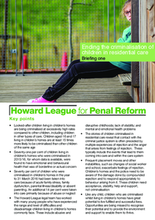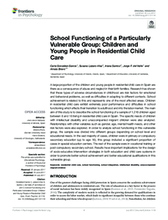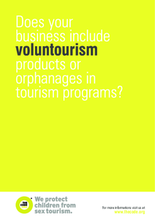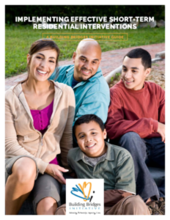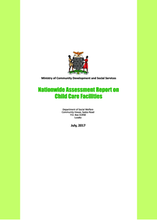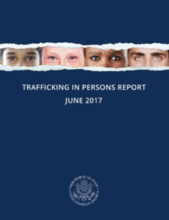Displaying 861 - 870 of 1511
This briefing the first in a series describing a programme of the Howard League for Penal Reform, which is intended to clarify why so many children in residential care in England and Wales are being criminalised at higher rates than their peers and identify examples of best practice to prevent their unnecessary criminalisation.
In this video, Kate van Doore describes the process of 'paper orphaning,' a term coined to characterize how children are recruited and trafficked into orphanages to gain profits through international funding and orphanage tourism.
This study describes the school functioning of a sample of 1,216 children aged between 8 and 18 living in residential child care in Spain. Results have important implications for the design of socio-educative intervention strategies in both education and child care systems in order to promote better school achievement and better educational qualifications in this vulnerable group.
This policy outlines the issues of voluntourism and orphanages in relation to child protection, and states the criteria by which organisations (private commercial companies, social enterprises and charities) involved in voluntourism activities may apply to join The Code.
This document serves as a guide for implementing short-term residential care interventions; grounded in evidence-based practice, the Guide provides "7 essential elements of short-term residential intervention" with case examples from the field in the United States.
The aim of this study was to identify the processes that support the good results obtained by the teenagers and young persons who reside in the largest residential centre in the county of Iași, Romania and their concerns regarding the future.
This qualitative study of risks and protective factors for violence against children living in
Residential Care Institutions (RCIs) for children is part of the wider qualitative study on violence
against children in Uganda. The study complements the national wellness survey that sought to
measure the prevalence of violence against children in household, schools and the community from
a quantitative perspective
This report is based on findings the Nationwide Assessment of all Child Care Facilities (CCFs) in Zambia, which aimed to gather evidence for the purpose of updating baseline information pertaining to the condition of all Child Care Facilities (CCFs) in Zambia; in line with the Minimum Standards of Care for Child Care Facilities (MSC), United Nations Convention on the Rights of the Child (UNCRC) as well as the UN Guidelines for the Alternative Care of Children.
This country care review includes the care-related Concluding Observations adopted by the Committee on the Rights of the Child during the seventy-fifth session (15 May 2017 - 2 Jun 2017) of the Convention on the Rights of the Child.
The Trafficking in Persons Report is an annual publication of the U.S. Department of State, providing a snapshot of human trafficking around the world with attention to key issues, trends, standards, and updates.

